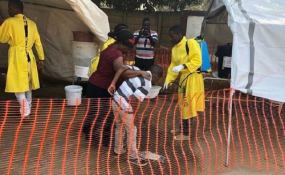
[ad_1]

Photo: @ WHOAFRO / Twitter
The World Health Organization is trying to contain the cholera epidemic in Zimbabwe.
The capital, Harare, has been inundated by the epidemic, with more than 3,000 cases reported. NGOs have accused the government of spending public funds to buy luxury goods instead of providing basic health care.
The latest cholera outbreak in Zimbabwe claimed the lives of 28 people, state media said Sunday.
The outbreak was detected for the first time earlier this month in a township outside the capital Harare and prompted the government to declare the state of emergency. At least 3,000 cholera cases have been reported in the city, home to 2 million people.
"Although I can not say we have contained the disease for now, we are moving quickly in all provinces of the country," Health Minister Obadiah Moyo told the Sunday Mail newspaper.
Drug resistant
Moyo said the strain of the disease was resistant to several drugs, which means that new antibiotics had to be approved to fight the epidemic. The government planned to remove garbage from the high-risk areas of Harare, repair sewer pipes and prevent street vendors from operating to contain the infectious disease.
Authorities also banned public gatherings in the city as a precaution, forcing the opposition MDC party to cancel an important rally on Saturday.
International NGOs involved
The World Health Organization (WHO) announced earlier this week that it was expanding its operations in Zimbabwe to help the government fight the epidemic.
In a statement, the organization said its goal was to strengthen coordination of the response and mobilize national and international health experts to form a "cholera control team".
"The WHO provides cholera kits containing oral rehydration solution, intravenous fluids and antibiotics to cholera treatment centers," the statement said.
Government faces criticism
Finance Minister Mthuli Ncube aroused public outrage last week when he launched an online funding effort by calling for donations to fight the epidemic.
The decision was criticized because of reports that the government was spending money on new vehicles for cabinet members.
Several local NGOs have gone so far as to blame the government for these deaths. "It is alarming and quite unusual that such a medieval and preventable disease continues to make such valuable victims nowadays," said the Coordinating Committee of Civil Society Emergency Response in a statement.
The Committee stated that the government's "failure to respect the right to health" constituted a serious violation of local and international law.
"Blame game"
But Health Minister Moyo rejected criticism of his government, saying it was not the time for a blame game.
Cholera is an acute waterborne diarrheal disease that can kill in a matter of hours if the infected person is not treated. The disease can be prevented by safe access to water and sanitation.
Cholera outbreaks in Zimbabwe, run out of money, are common as authorities have struggled to provide safe drinking water and sanitation facilities. In 2008, a total of 4,000 people died and at least 100,000 people became ill, which is the worst epidemic to date in the country.
(AP, AFP)
Every evening at 18:30 UTC, DW editors send a selection of news and quality reports. You can register to receive it directly here.
[ad_2]
Source link